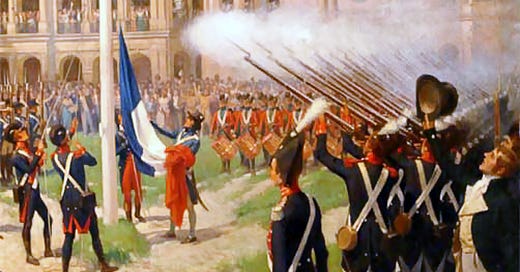On this day in 1803, American and French delegates sign the Louisiana Purchase Treaty. The U.S. Senate would soon approve the treaty, committing Americans to the purchase of an 827,000 square mile block of land for an astounding $15 million.
In other words, the United States would pay just 3 cents an acre for the vast tract of land. Um . . . What a steal?!
Louisiana had been caught in a musical chairs of sorts among Spain, France, and the United States. The land was originally a French territory, but Spain obtained possession of it during the 1760s. Just four decades later, yet another deal was struck: Spain would return Louisiana to France in exchange for lands in Italy.
The Spanish King wanted the small kingdom of Etruria, in northern Italy, for his daughter.
The deal left Americans in a bit of a pickle. They hadn’t been too worried about a Spanish neighbor who gave them navigation rights on the Mississippi River. Now, they had cause for concern: The powerful Napoléon Bonaparte was their new neighbor and access to the Port of New Orleans was shut down.
“Spain might have retained [New Orleans] quietly for years,” Thomas Jefferson wrote. “Her pacific dispositions, her feeble state, would induce her to increase our facilities there, so that her possession of the place would be hardly felt by us . . . . Not so can it ever be in the hands of France. The impetuosity of her temper, the energy and restlessness of her character, placed in a point of eternal friction with us . . . these circumstances render it impossible that France and the U.S. can continue long friends when they meet in so irritable a position.”
Jefferson decided to appoint James Monroe as a special envoy to France. Robert Livingston was already there, serving as U.S. Minister. Jefferson authorized the two men to spend up to $10 million for New Orleans, lands east of the Mississippi, and free navigation of the Mississippi River.
By the time Monroe arrived in France, things had changed: Napoléon was ready to sell Louisiana. He was mired in war with Britain and feeling desperate for funds. Moreover, many resources would be needed to defend the Mississippi valley, and he wasn’t sure it was worth it. He may also have feared that settlers in Louisiana could “be ‘contaminated’ by America’s idea of freedom,” as one Napoléon scholar has theorized. At least a sale to the United States would “create a huge country in the Western Hemisphere to serve as a counterweight to Britain.”
Whatever his motivations, Napoléon offered to sell the entire territory to the United States for $15 million. Livingston and Monroe decided to commit to the deal, even though it far exceeded their authority. They knew it would take months to update and receive approval from Jefferson, and they felt they might lose their window of opportunity if they did not act quickly.
Jefferson was surprised, to say the least, but he supported the decision. The Senate had only a few months to consider what it would do: The purchase treaty had to be ratified by the end of October 1803 in order to be valid. Many worried that the purchase was unconstitutional, but they also thought that a constitutional amendment would take too long. The Senate decided to go ahead and ratify the deal on October 20, despite the open constitutional question.
Spain was unhappy, but it had no recourse. The territory was formally transferred from Spain to France on November 30. Then it was officially transferred from France to America on December 20. On December 30, the United States took formal possession of the area.
The United States had doubled in size, practically overnight.
Sources can always be found on my website, here.





The Louisiana Purchase, here, and then Seward's Folly in 1867 (just 2 years after the end of the Civil Way) - both had truly huge impact on the United States of their time and continues even to today. Thank you, Tara Ross, for helping us remember key moments of history!
The bargain of the century. I'm sure that $15,000,000 was an enormous sum in 1800 but what is the value of $15,000,000 in today's money? Still a bargain, I'm certain. A doubling of territory, control of the mighty Mississippi, elimination of Spain or France as Western competitors and so many other positive reasons for the acquisition of the Louisiana purchase. Thank you Tara.